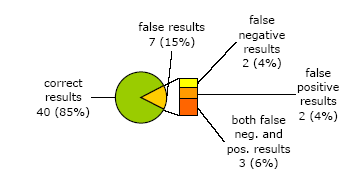The adventitious presence of GM seeds in non GM seed lots
has increasingly become a problem for the international
trade. Besides the politically difficult discussions
regarding the threshold for GM seeds in conventional seed
lots, the establishment of relevant, reliable and
economical methodology for detection, identification and
quantification of GM content in conventional seed lots
continues to be a challenge.
In view of the situation,
International Seed
Testing Association (ISTA)
laid down its position, and established a new strategy: At
the heart of this strategy was that the
ISTA GMO Task Force would organise proficiency
tests on GMO testing in conventional seed. The 2nd
GMO Proficiency Test was initiated in
February 2003. The Aim of this Proficiency Test on GMO
Testing was to check the ability of individual
laboratories to detect and, on a voluntary basis, to
quantify the presence of GM seeds in samples of
conventional seed of Zea mays L. The object of data
analysis was not to identify deviating laboratories but to
compile the performances in the laboratories and to
provide data for the laboratories' internal performance
data base.
Each participating laboratory received a set of 10 maize
samples. 3 samples were negative (no GM seeds added) and 7
samples were positive. Of the 7, 3 were spiked with 0.7%
GM seeds (MON810) and 4 were spiked with 1.4% GM seeds.
Laboratories could use the method they thought appropriate
for this test.
52 received the samples and 47 submitted their results
before the acceptance of results for the evaluation was
closed on 27 June 2003. All 47 laboratories reported qualitative results that could be
evaluated. 13 laboratories reported semi-quantative test
results that could be evaluated. 19 laboratories reported
quantative test results, with evaluable data, and
performed in total 20 test series since one laboratory
applied two different methods.
If you are interested in more information, or would like
to participated in the ISTA Proficiency Test on GMO
Testing, please contact the
ISTA
Secretariat directly at
ista.office@ista.ch,
or visit the website at
www.seedtest.org
Table 1: Number and percentage of all, negative and
positive samples reported as false.

Figure 1: Percentage of laboratories reporting correct and
false results.
